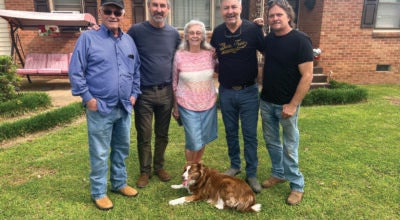Supes vote 3-2 to purchase gravel pit
Published 9:49 am Wednesday, June 3, 2020
Plan would also have county establish a rubbish site open to the public
By a 3-2 vote the Panola County Board of Supervisors has entered into a tentative agreement with Nolan West to purchase an 80-acre tract of land on Viney Creek Rd. for $500,000 with the intention of mining for gravel and operating a Class II rubbish pit.
The details of the arrangement remain unclear and the board is waiting on the results of an appraisal of the property, and its income potential, before finalizing the paperwork.
Voting for the purchase were supervisors John Thomas, James Birge, and Cole Flint. Against the purchase was Chad Weaver and Earl Burdette.
Both Weaver and Burdette maintain the county doesn’t need to be in the gravel pit business, noting that more equipment and county-paid employees would be necessary to monitor the gravel leaving the pit and the rubbish dumped into the part that had already been mined.
Those two supervisors also said the county should study the matter further, and resist the plan to commit taxpayers to the large sum during the ongoing pandemic considering the uncertainty of the economy over the next months and years.
Flint was reluctant to vote for an outright purchase of the property until the study the board received laid out the savings that might be possible by operating a rubbish pit instead of the county bearing the whole cost of the reclamation process.
With its own rubbish pit, the county would also save the costs of hauling debris – mostly downed trees and limbs from storms – to other facilities and paying dumping fees along with the expense of trucks and labor to make the trips.
Since 2006 the county has leased 46 acres of the property, mining some 844,586 cubic yards of gravel from the pit. The county currently pays West 70 cents per cubic yard for the lease
There is no weight scale at the pit, and the nearly million cubic yards of gravel hauled away from the site is largely based on records kept by the road department.
Road Manager Lygunnah Bean has pushed the supervisors to purchase an additional 34 acres surrounding the current pit for several months, saying the county will make up the sales price over time by avoiding the costs of purchasing gravel from private gravel pit operations if the pit were abandoned now.
At times Bean has been questioned about where the gravel mined from the pit has been taken throughout the county, but no accounting report of the total cubic yards is available.
Bean has told supervisors that within a year, maybe two, the county will have mined all the reachable gravel from the original 46 acres and plans should be made to expand the pit.
For many months the supervisors have debated whether to spend a half-million dollars for the entire property. Since 2006 the county has spent some $578,508.40 for the gravel that has been mined, not including the labor and equipment costs necessary to get the material out of the ground.
Those numbers are only through 2018, according to a study the supervisors commissioned. Panola County would have spent $2.8 million for that same gravel, the study said, if it had been purchased from private pit operators at an average cost of $3.25 a cubic yard.
Also a consideration is the fact that the county’s lease requires the pit (about 40 feet deep in places) to be reclaimed after mining has been completed. This means the county would be required to follow Mississippi Department of Environmental Quality standards to fill the hole and cover it with grass.
The current plan with the purchase of the whole 80 acres is to convert the 46 used acres into a rubbish pit that could accept uncontaminated brick, mortar, stone, old asphalt, and natural vegetation to fill the hole, with appropriate layers of topsoil inserted between rubbish.
The reclamation of the pit, without rubbish, would cost hundreds of thousands of dollars supporters say, and that cost could be shared by other counties and cities (and individuals) who would be charged to dump rubbish. Over time, the abandoned pit could be filled and the acreage reclaimed to fit MDEQ standards without incurring those high costs.
The supervisors are waiting on the appraisal study and the purchase of the property seems to be contingent on a positive set of numbers received.
More details of the proposed purchase will be published as they become available.






